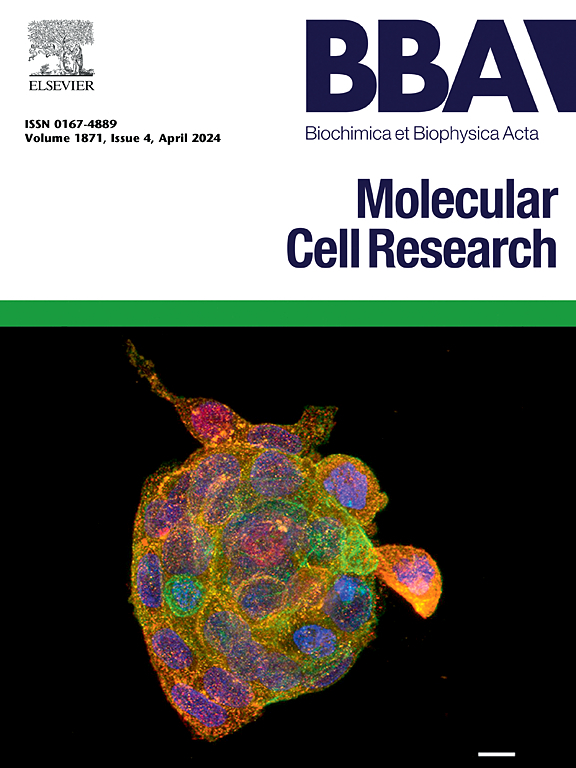YidC在膜蛋白生物合成和质量控制中的广泛作用
IF 3.7
2区 生物学
Q1 BIOCHEMISTRY & MOLECULAR BIOLOGY
Biochimica et biophysica acta. Molecular cell research
Pub Date : 2025-04-10
DOI:10.1016/j.bbamcr.2025.119956
引用次数: 0
摘要
膜蛋白是细菌生存所必需的,促进重要的过程,如能量生产,营养物质运输和细胞壁合成。YidC是膜蛋白生物形成的关键角色,作为插入酶和伴侣蛋白,以确保适当的蛋白质折叠和整合到脂质双分子层中。其保守的结构和适应性使其能够通过sec依赖性和非sec依赖性途径介导共翻译和翻译后蛋白插入膜。除了促进蛋白质插入外,YidC还与FtsH合作进行蛋白质质量控制,防止可能损害细胞功能的错误折叠蛋白质的积累。人们对YidC和FtsH之间的重要关系知之甚少,有必要进一步调查他们的合作。了解YidC和FtsH如何协调它们的作用可以为了解细菌膜蛋白生物发生和质量控制途径之间的联系提供有价值的见解。此外,鉴于其核心功能,YidC代表了抗菌药物开发的潜在靶点。小分子破坏了它在蛋白质折叠和插入中的功能,这是有希望的。然而,在不影响真核生物同源物的情况下实现细菌特异性仍然是一个挑战。在此,我们对YidC的结构、在膜蛋白生物发生和质量控制中的分子功能、已知的相互作用及其治疗潜力进行了综述。本文章由计算机程序翻译,如有差异,请以英文原文为准。
The versatile role of YidC in membrane protein biosynthesis and quality control
Membrane proteins are essential for bacterial survival, facilitating vital processes such as energy production, nutrient transport, and cell wall synthesis. YidC is a key player in membrane protein biogenesis, acting as both an insertase and a chaperone to ensure proper protein folding and integration into the lipid bilayer. Its conserved structure and adaptability enable it to mediate co-translational and post-translational protein insertion into the membrane through both Sec-dependent and Sec-independent pathways. In addition to facilitating protein insertion, YidC collaborates with FtsH in protein quality control, preventing the accumulation of misfolded proteins that could impair cellular function. This important relationship between YidC and FtsH is poorly understood, and there is a need for further investigation into their collaboration. Understanding how YidC and FtsH coordinate their roles could provide valuable insights into the links between bacterial membrane protein biogenesis and quality control pathways. Moreover, given its central functions, YidC represents a potential target for antimicrobial development. Small molecules disrupting its function in protein folding and insertion, hold promise. However, achieving bacterial specificity without impacting eukaryotic homologs remains a challenge. Here, we review our current understanding of YidC's structure, molecular function in membrane protein biogenesis and quality control, known interactions and its therapeutic potential.
求助全文
通过发布文献求助,成功后即可免费获取论文全文。
去求助
来源期刊
CiteScore
10.00
自引率
2.00%
发文量
151
审稿时长
44 days
期刊介绍:
BBA Molecular Cell Research focuses on understanding the mechanisms of cellular processes at the molecular level. These include aspects of cellular signaling, signal transduction, cell cycle, apoptosis, intracellular trafficking, secretory and endocytic pathways, biogenesis of cell organelles, cytoskeletal structures, cellular interactions, cell/tissue differentiation and cellular enzymology. Also included are studies at the interface between Cell Biology and Biophysics which apply for example novel imaging methods for characterizing cellular processes.

 求助内容:
求助内容: 应助结果提醒方式:
应助结果提醒方式:


